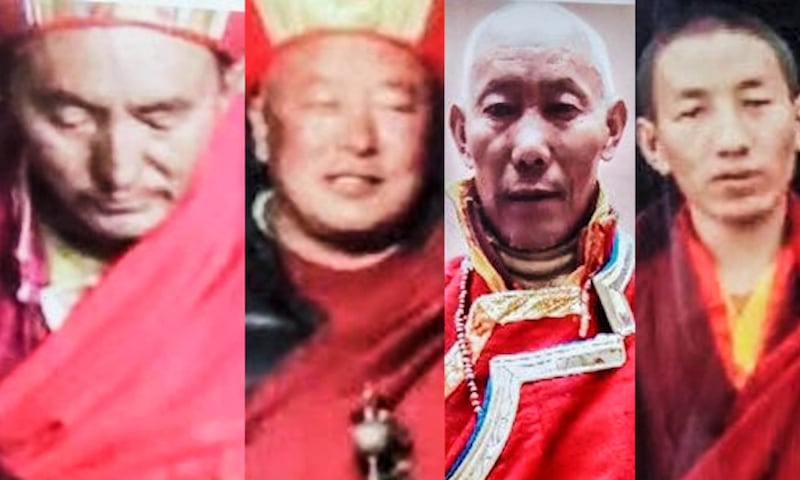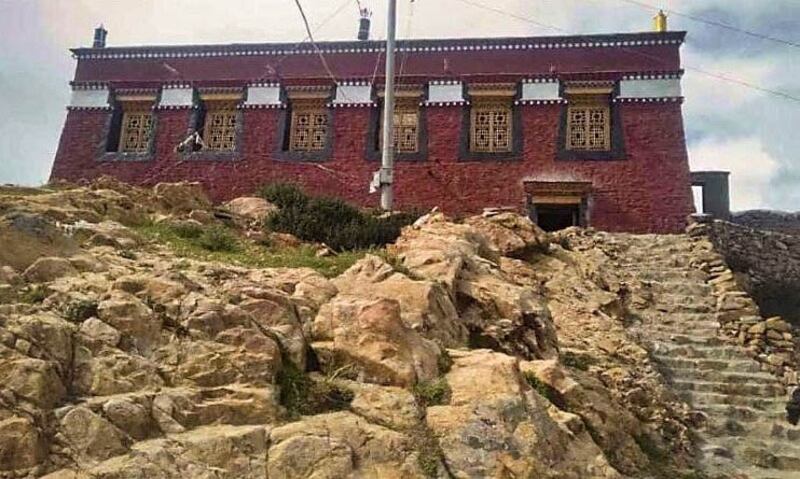Chinese authorities in Tibet last year sentenced four Tibetan monks to long prison terms following a violent raid by police on their monastery in Tingri county, a New York-based rights group said in a report released this week.
The raid followed the discovery in September 2019 of a cell phone containing messages sent to monks living outside Tibet and records of financial contributions made to a monastery in Nepal damaged in a 2015 earthquake, Human Rights Watch said in its July 6 report, “Prosecute Them With Awesome Power.”
The discovery of the phone owned by Choegyal Wangpo, a monk at Tingri’s Tengdro monastery, prompted his arrest and beating under interrogation, and was followed by a raid by armed police who assaulted the monastery and 20 private homes in Dranak, a village nearby, HRW said, citing sources in the region.
Police carrying out the raid beat resident monks and seized religious texts and photographs of exiled spiritual leader the Dalai Lama, the rights group said, adding that Chinese authorities then launched a program of daily political indoctrination the monks were forced to attend.
On Sept. 7, a Tengdro monk named Lobsang Zoepa took his own life, apparently in protest at the crackdown by authorities, and internet service to and from Dranak was immediately cut off, Human Rights Watch said.
Most of the monks detained in the raid were held for several months without trial and then released, HRW said, but four senior monks—Choegyal Wangpo, Lobsang Jinpa, Norbu Dondrub, and Ngawang Yeshe—were tried in secret by a court in Shigatse (Chinese, Rikaze) prefecture in October 2020 and handed prison terms of 20, 19, 17, and five years respectively.
Details of the charges made against the four were not available because of Chinese clampdowns on communications in the area, but Chinese laws do not currently forbid cross-border communications by phone or text message or the sending of funds abroad, HRW said.

'Shocking miscarriage of justice'
“Chinese courts usually impose extreme sentences only for recidivism, or for involvement in activities such as organizing protests, illegal organizations, espionage, acts of violence, or, increasingly, spreading unofficial news,” HRW said.
“Yet, there is no suggestion that any of the Tengdro monks had previous convictions or had taken part in such activities," the rights group added.
In a July 6 statement, Sophie Richardson—China director at Human Rights Watch—described the imposed prison terms as “unprecedented.”
“The Chinese government’s assumption that Tibetan monks and nuns are potential subversives, the heightened border security, and increased restrictions on online communications and religious donations all combined to create a shocking miscarriage of justice,” Richardson said.
“The horrific treatment of the Tengdro monks points to the Chinese government’s pressure on officials in Tibet to find and punish cases of political subversion—even if the alleged subversion is a figment of their imagination."

Formerly an independent nation, Tibet was invaded and incorporated into China by force 70 years ago, following which Tibetan spiritual leader the Dalai Lama and thousands of his followers fled into exile in India and other countries around the world. The Dalai Lama turned 86 in Dharamsala, India this week.
Chinese authorities maintain a tight grip on the Tibetan region, restricting Tibetans’ political activities and peaceful expression of cultural and religious identity, and subjecting Tibetans to persecution, torture, imprisonment, and extrajudicial killings.
